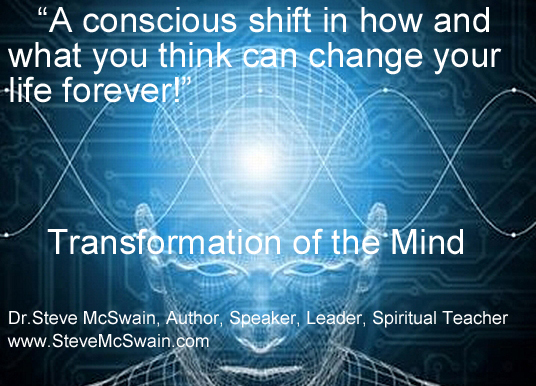
"Our aim in taking the spiritual path," writes Matthieu Ricard, in his bestseller, Happiness: A Guide to Developing Life's Most Important Skill"is to transform ourselves," and we do that, he says, by "transforming our minds."
Transformation of the mind?
What the Buddhist monk has suggested is not unlike what Saint Paul suggested in his letter to the Romans, "Be ye transformed by the renewing of your mind," (Romans 12:1-2).
What needs transforming or changing in your mind? Or, more precisely, in your thinking?
...What you think about yourself?
...The thoughts you think about someone else?
...Or, what you think (and how you feel) about life itself?
Much of how we feel about ourselves, others, and even life is the consequence of our thoughts. Which is why Saint Paul, in his letter to the Philippians said, "Think on these things," and enumerated the things we should intentionally work at thinking on (Philippians 4:8).
And it is work, my friend. Which is why Paul and the monk both say you must make the transformation of your thinking the goal of your spiritual path or practice (Philippians 4:9).
When I coach clients and colleagues I am often asked, "How do I change my thinking?"
Try the following...
1. Know first what it is you are thinking. That is to say, be the observer of your thoughts. I cannot stress more strongly that you are not your thoughts. You are instead, the observer of your thoughts.
Even say this is not exactly true. But it is closer to the truth of who you really are. Train yourself to observe the thoughts that randomly appear in your mind stream. This creates a little separation between you, the real you, and the thoughts you are thinking.
But, that's just the first thing you must do to transform your thinking.
2. Review your thoughts for truthfulness. Why? Most of your thinking is not only toxic, it is simply not true. Here, "The Work of Byron Katie," as she calls it, has become widespread and helpful.
"The Work" consists of four questions and turnarounds. For example, you might think and so feel that "____________ never listens to what I'm saying!" About whom have you had such a thought? Your spouse or partner? Your boss? Someone with whom you work?
Once you identify who that person is and have filled in the blank, then put that statement... that thought... under the scope of scrutiny, or the four questions and turnarounds of "The Work."
Is it true? (Yes or no. If no, go to question three).
Can you be absolutely sure it is true? (Yes or No).
How do you react, or what happens, when you believe the thought? Believe it is true?
Who would you be without the thought?
Then, turn the thought around. A "turnaround" is the opportunity you give yourself to both know and experience the opposite of the toxic thought. For example, when you complain that "____________ never listens to me," maybe what you're really saying is, "I don't listen to me."
Well, do you? Have you been listening... observing... your own thinking? I suspect this may be what really needs changing.
What do you think?
Read more from Dr. McSwain on his blog, Your Best Life Now.
For more by Steve McSwain, click here.
For more on mindfulness, click here.